A Return to Romania
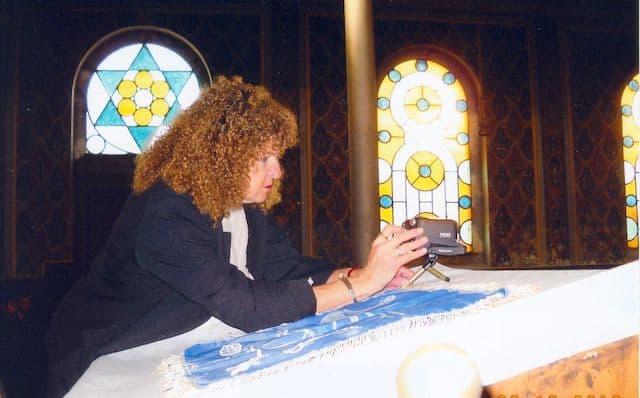
I had a farm in Romania. Literally and figuratively. Literally, it was three parcels of undeveloped land that my grandfather deeded to my father. Figuratively, it’s an invisible bond to a culture and a heritage I know little about and the inexplicable, unseen forces that seemed to be pulling me toward it.
The “undeveloped” part is an operative word because that word was what allowed me, as an American citizen, or specifically a foreign national, to make a claim for restitution on land that was nationalized in 1946 by the post-war Communist government of Romania. It began as a lark, something to do because I found out that I could, and it became so much more.
In 1993, two years after our father had passed away, my sister Robin and I took our mother on a roots trip to Eastern Europe. We visited places Mom had visited as a young girl, like Budapest and Vienna, but we also included a trip to Mom’s hometown of Munkacz (formerly Czechoslavakia, now Ukraine) and a side trip en route back to Budapest to Livada, just over the Hungarian border into Romania, where my father had been born. Crossing the border from Hungary into Romania, you arrive in Satu Mare, a lovely bustling city with still-beautiful gardens and buildings.
As you drive up the country road toward Livada, known to my father by the Hungarian name Sarkoz, time stops, and you’re transported back to the Romania my father left behind in 1938. There are still no traffic lights and the primary modes of transportation, other than the occasional automobile that passes through without stopping, are bicycles and carts drawn by horses.
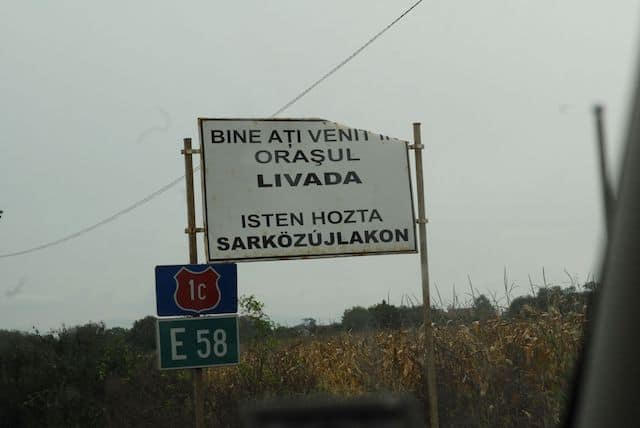
I had a farm in Romania. Literally and figuratively.
We arrived there in our VW Microbus, Mom, Robin, my cousin Lisa, our driver/translator Gregory and me. Mom suggested finding someone of a certain age to ask for information, meaning that if they were over 60, they likely still spoke Hungarian—like they did when the area was Austria-Hungary–which she and Gregory could speak.
An elderly man was walking along the road when we pulled up beside him, and Mom asked him in Hungarian if he spoke Hungarian. Having nodded affirmatively, she then asked if he knew where the Weisz family farm had been. He nodded again, and she asked if he would take us there. He was reluctant because he said he had to pick up some medicine at the pharmacy for his wife, but when we offered to drive him there, he seemed to acquiesce. As he climbed into our van, I couldn’t help but wonder if this was the first time he had been in a car.
We couldn’t have driven more than three blocks when the man pointed in the direction of a mill and nodded again. As we got out of the van, curiousity got the best of the locals, and they began to fill the quiet residential street. It quickly appeared to us that calendars would be marked off to commemorate the day the Americans arrived. There wasn’t much to see, just a mill that seemed to be processing grain that appeared to grow somewhere in the distance and a house that was being used as an office—was that the family house? No one knew for sure. A woman came forward saying that she owned the mill and wanted to buy the land from the government. Could we help? She carefully wrote out her name and address.
Then an apple- cheeked old woman wearing a triangular babuska on her head came up to me and said in Hungarian, “I knew your grandfather, I prayed for him.” That was it, my connection to this place, even while I doubted that what she said was true on the day in May, 1944 when the trains deported the Jewish community of Livada and the surrounding areas to the camps at Auschwitz. I did know, however, that I was not done with this place.
“I knew your grandfather, I prayed for him.”
It was the Austro-Hungarian Empire back when my father was born before World War 1. I used to love to tell my school friends that my father was from Transylvania—which is where Livada really is—because it is the home of the legendary Count Dracula. Fast forward 12 years to 2005, and there I was again, this time part of a tour group that was exploring much of Romania (and Bulgaria) by bus (we even visited Bran Castle, where Count Dracula allegedly lived).
When I was first sent the tour itinerary, I noticed a lunch stop in Satu Mare followed by stop in Sighet, birthplace of Elie Wiesel. There are two roads out of Satu Mare to Sighet, and it appeared we would be taking the one that by-passed Livada so I asked the tour group leader if there was a chance of taking the other road instead. When I explained that the alternate route would take us past my family’s farm, the itinerary change was greeted with great anticipation.
So there I was holding the piece of paper on which Anna had carefully written out the address in 1993. This time I found a bustling business that made—of all things—building supplies like decorative cement blocks to make fences and curved roofing tiles. It was not lost on me that I come from a long line of architects and home builders on both sides of my family. Once again, I was asked about whether I could make a claim for the land so that the owners of this thriving business could buy the land from me.
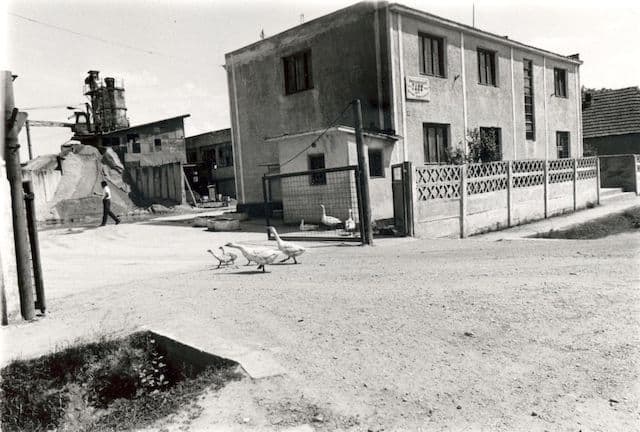
In preparation for the trip, I went through a file of papers that had been left behind by my father and found a number of fragile documents on thin, onion-skin paper, type-written and embellished in fountain pen. I also found years worth of pages of documentation of his and my uncles’ efforts to make claims for restitution through both the U.S. and the Canadian (where my uncles lived) governments. I made xerox copies of the papers that looked important, and one night during the trip I told our guide, Catalin, that I was buying him dinner in trade for his translation skills. What he translated were deeds to specific parcels of land.
The return visit to the family farm fueled my interest in the possibility.
The return visit to the family farm fueled my interest in the possibility of making a claim on the land, so when I got home in early November, I hit the internet in earnest looking for information on land claims in Romania. By the middle of the month, I hit paydirt—a law that was on the books allowing foreign nationals to make claims for restitution of “undeveloped farmland.” This law in question had already expired six weeks earlier, on September 30, 2005, but in the small print I found that it had been extended to the end of November. I now had two weeks to navigate these foreign waters.
I contacted the American Embassy in Bucharest which forwarded a list of recommended attorneys. None of them were based in the region where my claim would be made so I took a random stab, and with each contact, I added another piece of needed information. I would need to make the claim in the court in Livada so it would be advantageous to find a local representative rather than one who would have to travel there from the capital at great expense to me. One actually asked for a retainer of $10,000 in U.S. dollars for what I still considered a whim!
Here’s where the inexplicable, unseen forces began to work their magic. During the trip to Romania, our group met several members of a youth organization called Oter, which is dedicated to bringing Judaism back to Romania. The parents of these young people grew up under Communism with no religion, and their children, knowing that they are Jewish by birth and heritage, are determined to reinstate that culture and its customs.. One of the young students we met in Clug so impressed a couple who were travelling with us that they helped him make applications to universities in the United States. He is now nearing graduation from Duke University in North Carolina.
I now had two weeks to navigate these foreign waters.
On our last night in Bucharest, Andrei, the president of the organization, joined us for dinner. I went online to get his contact information and discovered that Oter had a chapter in Satu Mare, so I emailed Andrei and told him my story. Within minutes, he connected me with Sebastian in Oter’s Satu Mare chapter, and a short time later, Sebastian emailed me with a name—Nicolae Descai. He’s the head of the Jewish community in Satu Mare, Sebastian wrote to me, and….he’s a lawyer. Bingo. Unseen forces converging.
Nicolae was, and is still, not internet savvy, but he did have a cell phone, he spoke English and he has a sister in San Diego. Does this not sound like a movie already?
I called him late at night, my time, which was the start of the day his time. He listened to my story and simply outlined what he would have to do, which was basically drive to Livada and file the papers before the deadline. By the time I got to my office that morning, he had faxed a carefully handwritten document in Romanian that I needed to have notarized giving him power of attorney to act on my behalf in making the claim.
Now I contacted the Romanian Embassy in Los Angeles and got the name of a local notary who speaks Romanian. He is a travel agent in Glendale, who needed some convincing to generate this document in a day instead of a week. By now, it was the Friday before Thanksgiving, and he told me to come to his office on Tuesday morning. Then the fun began.
The document was ready for my signature and his notarization upon my arrival, but that was just the beginning.
The document was ready for my signature and his notarization upon my arrival, but that was just the beginning. He then gave me directions to the Los Angeles County Courthouse in Van Nuys where I had to have his signature verified, followed by a trip to the downtown Los Angeles office of the Secretary of State of California to have the entire document “apostilled.” Even friends of mine who are familiar with Latin had never heard this term before. It allows a legal document created in one country to be recognized by a foreign government. It should be a Trival Pursuit question.
It took an entire day and nearly 100 miles of driving to get these documents together, something I realized would not have even been possible in most other cities in California. As I headed back to my office with all the required papers, I called Federal Express, where I have an account, to arrange the shipment to Satu Mare. I found out they did not ship there, at least not directly, so I called DHL, and they not only do, they guaranteed the package would be there by Friday. Their driver met me at my office with their shipping forms, and off went the precious documents.
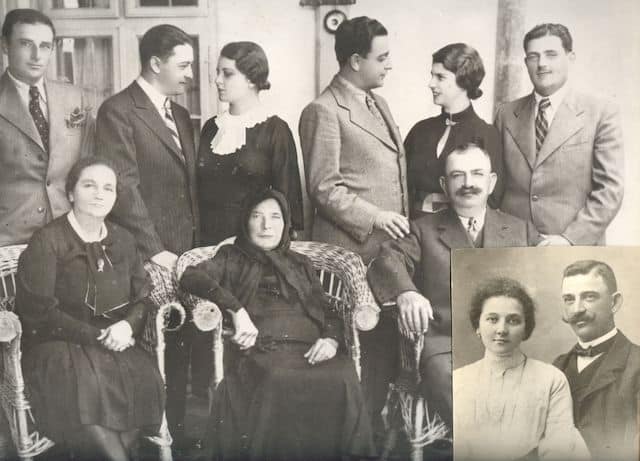
I phoned Nicolae to let him know the package was on its way and finally broached the subject of money. What did he need? He mentioned gas, document filing fees, time, and then he said it: $100? I told him I would make arrangements with Western Union to deliver the money to him and promptly wired twice the amount he requested for the same wiring fee.
On November 29, 2005, one day before the land claim law expired once again, my claim was entered for three parcels of undeveloped farmland at the office of the magistrate in the town of Livada, county of Adrian, in Romania. That year I sent Nicolae and his family a Chanukah card, and when I received one in return featuring Santa Claus going down a chimney, I realized mine was the first real Chanukah card they had ever received.
I realized mine was the first real Chanukah card they had ever received.
I would get occasional faxes from Nicolae, which he sent from the office of the Jewish Community of Satu Mare, but progress on the claim was slow. One day, I received a fax with a request. He asked me to order a wig for his wife from a catalog he had found. He had the specific catalog number, size and color. His wife, he explained, had a condition that caused her to lose her hair. Ordering the wig online was easy. Shipping to Romania cost more than the item itself, so I ordered two for the same shipping cost. It was the least I could do.
Another fax told me that someone claiming they were related to my grandfather was also claiming rights to the same land. None of that was true. Another fax requested a new copy of my birth certificate. It is only recently that I have become reluctant to reveal that I was born on the Jersey Shore because the television show has cast that area in such a negative light. I’ve had my birth certificate locked in my safety deposit box for years and never before noticed that the lovely handwritten document with the embossed seal from the State of New Jersey on it doesn’t say who my parents are. Ironically, I had to contact the State of New Jersey for a new one right as they were shutting down their state offices until a new state budget could be passed.
Yet another fax was the most startling of all. Nicolae had an offer to buy the land contingent on my getting title to it. After several conversations back and forth, a deal was struck, but it didn’t get me any closer to anything official. Even with this nominal gross figure in mind, I never considered that the sale would go through and, regardless, I knew that any money from it wasn’t really mine. I resolved from the beginning that I would use it to do “something” for the Jewish community there in memory of my father and his family.
Yet another fax was the most startling of all.
Time passed, to the point where I pretty much forgot about the claim except when one of my friends or relatives would ask for an update. And I would tell them there simply wasn’t one. Until one morning in May of 2010 when I received a phone call. It was Annie calling, Nicolae’s sister in San Diego. He had contacted her asking her to try all of my phone numbers and track me down. The title to the land was mine, the land was sold and the money would be received by the end of the month.
My head was reeling with the news. In all reality, less than five years had passed, which in the world of land claims in Eastern Europe is the blink of an eye. Within a few weeks, Nicolae emailed me (or I should say his son Paul who handles the electronic transmissions) with a copy of the bank information.
After much prodding, I finally received an email answering my question about what I could do for the Jewish community of Satu Mare that would be meaningful. The Decebal Street synagogue, built in 1893, needed a parochet, the curtain that covers the Aron Kodesh that holds the Torah scrolls. Apparently, there once was one but it was gone, stolen long ago. Would I like to take care of this? Nicolae sent measurements.
I contacted my Rabbi and friend Joseph Telushkin for information on where to have such an item made. He referred me to his friend at Levine Judaica in New York, and the process began. Once I found out what decisions needed to be made before ordering, I consulted my sister and my cousins in Canada in creating the dedication that would be embroidered on the cloth. I placed the order at the beginning of August, and when I was asked where it was to be sent, it hit me that I didn’t want to ship it to Romania. Rather, I wanted to bring it there myself.
I wanted to bring it there myself.
In the meanwhile, I began researching programs in Romania to which I could make a significant meaningful donation of a large portion of the money. I was referred by Sebastian to Children in Need, a program of the Social and Medical Assistance Department (SMAD) of the Federation of Jewish Communities of Romania, based in Bucharest. After much correspondence with Attila Gulyas there, we isolated a program that aids students who have aged out of the organization’s youth programs and are pursuing university studies despite financial hardships. Ten university students were selected from the program, each with their own unique story, who would benefit from a small windfall to continue their education. It made me wonder if they would feel like they won the lottery. I certainly would.
When I informed Nicolae that I had ordered the parochet, he emailed me that he would like to hold a celebration in the synagogue, a sort of dedication, and bring in a rabbi and a klezmer band for the occasion. That sort of settled it for me. I let him know that I would like to bring the parochet personally and would try to come for the event. When I gave him dates that would work with my schedule (I had a client performing in Europe with which I could combine this trip), they coincided with his perfectly. It seems they cannot get a rabbi to come on a holiday or the Sabbath because there are only three rabbis in Romania, and they officiate at their own congregations. Therefore, a Sunday would be best, and October 3, the Sunday following Sukkoth, was selected.
Nicolae wrote me a long letter of explanation and faxed it to me. The problem was that it was written in Romanian, and while I could pick out a few key phrases that I could translate on the computer, his flowing European handwriting, reminiscent of my Uncle Andrew’s, was particularly difficult to decipher. A light bulb went off, and I called my cousin Lisa to ask her how to contact Calin, her masseuse from Romania. After she asked me why, she told me to be at her house the following morning at 9AM because he would be there for her appointment.
A Return to Romania.
Calin translated the parts of the letter that were unclear to me. This celebration would take place in the synagogue which is not used very often (for one thing it was very costly to heat in the winter time). In fact, the last time it was used in earnest was in May of 2004 to commemorate the 60th anniversary of the deportation of the Jews of the area to Auschwitz.
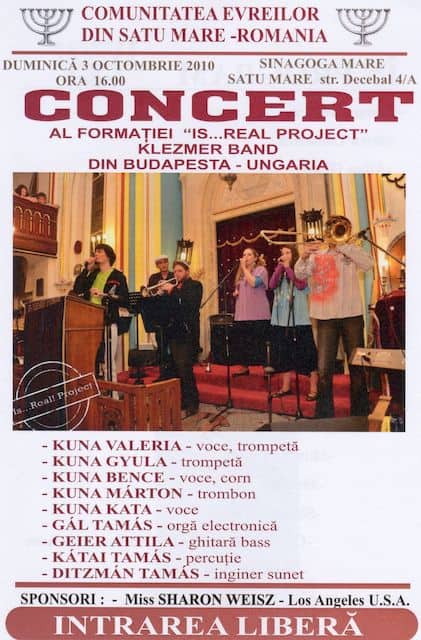
As part of that commemoration, a Holocaust memorial on the grounds of the synagogue was dedicated. My grandparents and my aunt and her husband and son were among those remembered that day. How fitting that the next such event would memorialize them all. On May 19, 1944, six trains with approximately 3300 persons departed for Auschwitz. In total 18863 Jews were deported from the area. A total of 14440 Jews from Satu Mare were killed during the war.
So now another trip back in time, to a place where time has stopped. Satu Mare is a city, but the outlying area where the farm was situated, is still undeveloped and unchanged. Perhaps it is fitting that it remained so or none of this could have happened.
On September 29, I took off for Europe, carrying the curtain with the dedication in memory of my grandparents, father, uncles and aunt in my very overweight carryon. I arrived the next morning in Frankfurt where my client was performing in a nightclub that evening. On Friday, October 1, I flew to Bucharest and on to Satu Mare, arriving at the tiny airport in the early evening. Nicolae’s son Paul picked me up in a very American PT Cruiser and drove me into town where I checked into the Hotel Astoria right on the main square. So much felt familiar. Nicolae met us at the hotel to say hello and that he would pick me up in the morning to take to Shabbat services at the synagogue.
The services were subdued, less than a dozen participants, mostly women, held in a small prayer room, led by a lay person who sped through the prayers at a lightning pace. The short service was followed by Kiddush. Then we repaired to the main sanctuary to hang the parochet. It was very moving to see the large curtain I had carried dwarfed by the height of the room.
Nicolae gave me a tour that included a smaller sanctuary, behind the room where the Shabbat service was held, which is used more frequently for services and events. It houses a framed memorial containing the last parshah that was read in the synagogue before the Jews of the area were deported to Auschwitz in 1944. He also showed me his office and the infamous fax machine from which I received so many missives over the past five years.
Paul then took me on an excursion into the countryside. First stop was Livada, aka Sarkoz, which in the Hungarian of my father means “between the mud.” The Romanian translation is more sublime: Livada means “orchard.” While the streets seemed more even and paved and a few trucks passed us by on the street, the town looked essentially the same to me as it did in 1993 and 2005, though the Tarr building products factory appeared to have grown into a cottage industry. This time, I didn’t knock on the door because I knew I couldn’t make a claim on the land that had their factory on it, and they seemed to be doing well without owning the land on which they operate their business.
The entire community came out, Jews and non- Jews alike.
On Sunday afternoon, after visiting the open market to buy food for a lovely lunch, the celebration at the synagogue began at 4PM. The entire community came out, Jews and non- Jews alike, filling every seat in the synagogue and leaving some people standing in the doorway. Attila, from the Children in Need program came in from Bucharest and presented me with a list of the students that I am endowing with a little background on each of them.
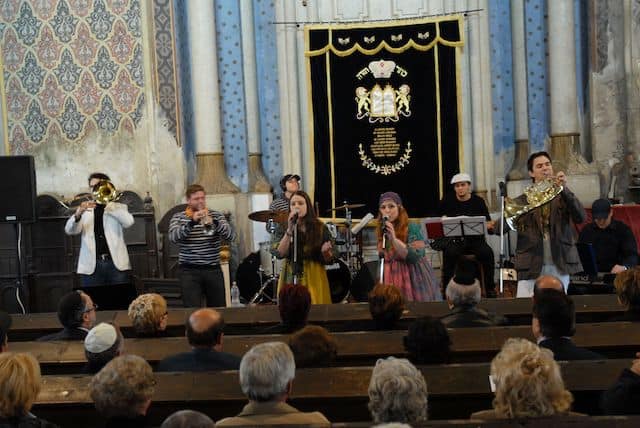
There were some speeches and blessings and prayers from the Rabbi—after being acknowledged as the “sponsor,” I was coaxed into saying a few words too—followed by an hour of joyous music from a seven-piece group comprising five siblings called the Is…Real Klezmer Band who came in from Budapest. I set my video camera on the bimah in the center of the sanctuary and let it rip. Another surprise—the battery never ran out.
The next morning I flew out by way of Bucharest to London, and as I got on the plane in Satu Mare, two women came up to me to thank me for the wonderful concert they had attended the day before. Just recently I received letters from two of the students telling me what the money they received will mean to their education and their lives.
I hope my father is smiling. I certainly am.
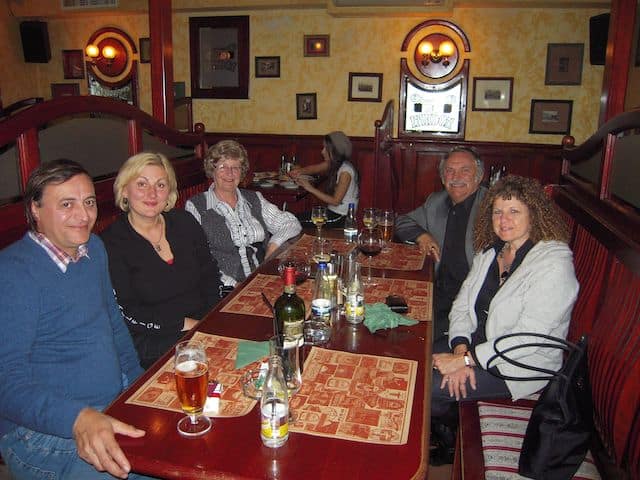
Photo credits for A Return to Romania by Sharon Weisz.

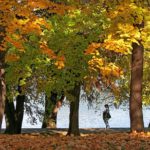
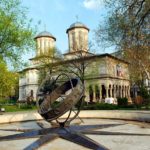
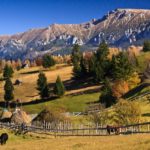
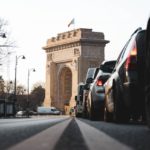
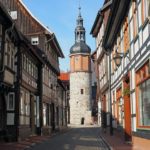
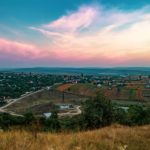
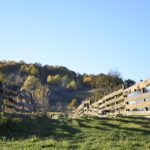
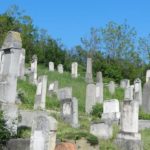
Great article!
My dad is long gone, but thank you so much for the sentiment. I’m happy you enjoyed the story.
Wow, what a story. Congratulations, I’m sure your dad is proud. Very inspiring.